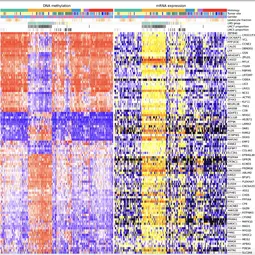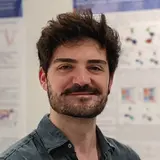Applied Bioinformatics
- Functional and Structural Genomics

Prof. Dr. Benedikt Brors
We use methods from computer science, bioinformatics and statistics to gain a better understanding of cancer development and progression, and improve cancer care. We use the results of our bioinformatics studies to build clinical applications that provide novel clues for cancer therapy, including targeted treatments and immunotherapies.

Our Research
We are a computational group working on analysis of high-dimensional data from cancer. Most of these data are coming from sequencing-based assays, such as whole-genome sequencing, RNA sequencing, bisulfite sequencing, ATAC sequencing as well as their single-cell variants. By analyzing this data, we obtain unique insight into cancer mechanisms, evolution, progression, response to therapy and its interaction with the immune system. This helps to identify optimal, targeted therapies for each individual patient (“precision oncology”).
We develop methods and workflows that deal with massive amounts of data on distributed compute systems, including artificial intelligence technology. Our workflows have been implemented into clinical trials at the National Center for Tumor Diseases. In addition, we contribute to clinical trials of the European Study Group for Pancreatic Cancer and the German Neuroblastoma Study Group.
We are affiliated with the National Center for Tumor Diseases (NCT) and the German Cancer Consortium (DKTK). In addition, we contribute to infrastructures like the German Network of Bioinformatics Infrastructures (de.NB) and the German Human Genome-Phenome Archive (GHGA).
Projects
The Comparative Cancer Genomics team lead by Dr. Lars Feuerbach focuses on integrating sequencing and array data across tumor subtypes and patient cohorts. In these Pan-Cancer studies the similarities and differences in the interplay of epigenome, genome and transcriptome during carciogenesis are investigated in context of three main interests:
Focus 1 - Replicative Immortality and telomere biology in cancer
Focus 2 - Identification of regulatory cancer driver mutations for precision oncology applications
Focus 3 - Software tool development for the analysis of cancer cohorts
Furthermore, following up on the ICGC Early-onset Prostate Cancer consortium, we study prostate cancer as part of the Pan Prostate Cancer group of the ICGC ARGO project.
Our methodological expertise for computational cancer genome analysis comprises algorithm development, specialized datastructures for multi-omics data integration, data mining by machine learning, compact visualization of complex information, and statistical modeling.
The Tumor Heterogeneity and Evolution team lead by Dr. Sadaf Mughal focuses on the application of computational methods to analyze omics data from patient cohorts to understand cancer heterogeneity, tumor evolution and to decipher the immune crosstalk in cancer progression and metastatic spread. We are particularly interested in learning drug resistance mechanisms tumor employ during evolution. For this we are investigating longitudinal samples to predict the evolutionary trajectories of aggressive metastatic subclones. Furthermore, we are studying the tumor-immune coevolution to address inter- and intra-tumoural heterogeneity, dictating progression of disease.
The Computational Oncoimmunology team lead by Charles Imbusch focuses on questions regarding the immune system in general and more specifically under pathogenic conditions such as cancer. To address these questions NGS, as well as array technologies, are routinely utilized.
With the advent of multiple single cell technologies it is now possible to differentiate subpopulations captured in an assay, allowing to address cell heterogeneity and the discovery of rare cell populations. We focus on the downstream analysis of scRNA-seq and scTCR to robustly identify and describe cell populations, study dynamic cross-talk between tumor and immune cells while keeping up to date with most recent algorithmic developments.
Alternatively to single cell assays we apply and develop methods to deconvolute from bulk data cell types, integrating epigenetic and transcriptomic data to describe the tumor microenvironment.
The AI in Translational Cancer Research team led by Benedikt Brors develops predictive and prognostic models to guide therapy for cancer patients. We are currently contributing AI models to two clinical trials, ESPAC-6 for adjuvant treatment in resectable pancreatic cancer (phase III, sponsor: University Hospital Heidelberg), and NB2015-LR for low- and medium-risk neuroblastoma (phase III, sponsor: University Hospital Cologne).
Team
- Show profile

Prof. Dr. Benedikt Brors
Head of Division
-

Dr. Lars Feuerbach
Team Leader Comparative Cancer Genomics
-

Dr. Sadaf Shabbir Mughal
Team Leader Tumor Heterogeneity and Evolution
-

Dr. Charles Vomfelde genannt Imbusch
Team Leader Computational Oncoimmunology
-

Dr. Oscar Gonzalez Velasco
Postdoctoral Researcher
-

Dr. Siao-Han Wong
Postdoctoral Researcher
-
Dr. Evgeniya Denisova
Postdoctoral Researcher
-
Farhad Faghihi
Doctoral Student
-
Karina Martinez
Doctoral Student
-

Julia Münch
Doctoral Student
-

Ferdinand Popp
Doctoral Student
-

Silja Schlue
Doctoral Student
-
Lenart Zezlina
-
Prof. Dr. Ezekiel Femi Adebiyi
Guest Scientist
-
Corinna Sprengart
Administrative Assistant
-
Hans Bartelmeß
System Administrator
Selected Publications
Simon M*, Stüve P*, Schmidleithner L*, Bittner S, Beumer N, Strieder N, Schmidl C, Pant A, Gebhard C, Eigenberger A, Rehli M, Prantl L, Hehlgans T, Brors B, Imbusch CD, Delacher M, Feuerer M.
Comprehensive Genomic and Transcriptomic Analysis for Guiding Therapeutic Decisions in Patients with Rare Cancers
Horak P, Heining C, Kreutzfeldt S, Hutter B, Mock A, Hüllein J, Fröhlich M, Uhrig S, (…),Brors B, Stenzinger A, Schröck E, Hübschmann D, Weichert W, Glimm H, Fröhling S
Pan-cancer analysis of whole genomes
ICGC/TCGA Pan-Cancer Analysis of Whole Genomes Consortium
Genomic footprints of activated telomere maintenance mechanisms in cancer
Sieverling L, Hong C, Koser SD, Ginsbach P, Kleinheinz K, Hutter B, (…), PCAWG-Structural Variation Working Group; Brors B, Rippe K, Jones DTW, Feuerbach L; PCAWG Consortium
Chudasama P*, Mughal SS*, Sanders MA*, Hübschmann D*, Chung I, Deeg KI, Wong SH, (…), Brors B, Hutter B, Renner M, Hohenberger P, Scholl C, Fröhling S.
Get in touch with us

